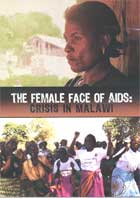
The Female Face of AIDS: Crisis in Malawi 2007
Distributed by Choices, Inc., 3740 Overland Ave., Ste. F, Los Angeles CA 90034; (310) 839-1500
Produced by The Leitner Center for International Law and Justice at Fordham Law School & Chop Wood Carry Water Productions
Directed by Doug Karr and Edward Boyce
DVD, color, 33 min.
Sr. High - Adult
African Studies, Gender Studies, HIV/AIDS, Human Rights, Malawi, Public Health
Date Entered: 01/29/2009
Reviewed by Sue F. Phelps, Washington State University, Vancouver, WAFaculty and students of the Leitner Center for International Law and Justice at Fordham Law School traveled to Malawi during the final weeks of a year long study on gender, HIV/AIDS, human rights, and the culture and history of Malawi. They were there to interview 100 HIV positive women about their experience living with the diagnosis. This DVD brings the viewer along on their trip to Malawi through clips from those interviews, scenes from the daily life and celebrations of the Malawi people. It is an excellent visual representation of the team’s full report which can be found on the Leitner website titled, “We Will Still Live: Confronting Stigma and Discrimination Against Women Living with HIV/AIDS in Malawi.”
The interviews reveal the stigma of HIV/AIDS in the community, the discrimination found in social programs and the response of the legal system to the 14% of adults, 60% of whom are women, reported to be HIV positive. Most of the women report the stigma and discrimination of the disease is made worse by the culture’s treatment of women in general. Men are also interviewed regarding the cultural practice of multiple marriage, extramarital girlfriends, and the refusal to use protection from disease. One child who is HIV positive talks about the loss of both parents and the treatment he suffers from other children as well as the expectations of the family who is caring for him.
Though the issues are discussed at length and the situation of the women is grim there are also some positive responses to the crisis. It is clear that one of the primary contributors to the stigma and prejudice against those who are HIV positive is the ignorance regarding the disease. There is one clip from a school where young women are being taught the facts about AIDS and HIV resulting in their being empowered to take care of themselves within cultural boundaries. There is also a women’s support group through which women with HIV/AIDS are teaching newly diagnosed women how to live with the disease. Legal interventions are addressed from the perspective of legal services and the promotion of anti-discrimination legislation.
The audio and video qualities are excellent with the use of some artistic touches throughout. Where accents are difficult to understand there are subtitles as well as when interviewees are speaking in the native Malawian language. Because interviews are interspersed with clips of celebration and daily Malawian life the difficult content is made manageable for the viewer. Special features include a photo gallery of stills from the DVD and a URL to direct you to the Choices website for a guidebook. The guidebook consists of the complete report found on the Leitner website. Though the video mentions lesson plans there are none available on the Choices or Leitner site.
This DVD would enhance collections in support of social justice, public health, women’s studies, African studies, human rights, and HIV/AIDS.